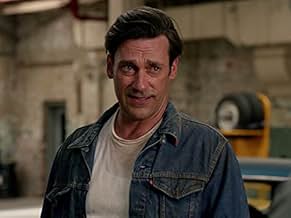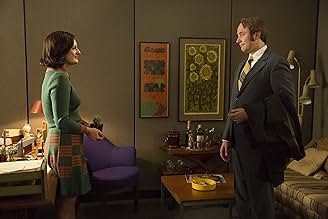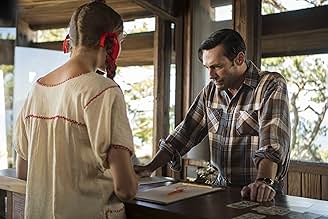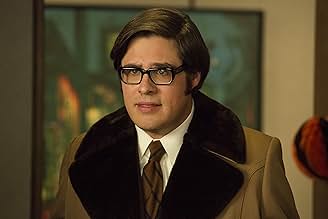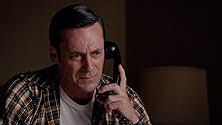यह सीरीज़ 1960 की शुरुआत में न्यूयॉर्क की सबसे प्रतिष्ठित विज्ञापन एजेंसियों के सबसे रहस्यमय और बेहद प्रतिभाशाली विज्ञापन अधिकारी, डोनाल्ड ड्रेपर की ज़िन्दगी पर केंद्रित है.यह सीरीज़ 1960 की शुरुआत में न्यूयॉर्क की सबसे प्रतिष्ठित विज्ञापन एजेंसियों के सबसे रहस्यमय और बेहद प्रतिभाशाली विज्ञापन अधिकारी, डोनाल्ड ड्रेपर की ज़िन्दगी पर केंद्रित है.यह सीरीज़ 1960 की शुरुआत में न्यूयॉर्क की सबसे प्रतिष्ठित विज्ञापन एजेंसियों के सबसे रहस्यमय और बेहद प्रतिभाशाली विज्ञापन अधिकारी, डोनाल्ड ड्रेपर की ज़िन्दगी पर केंद्रित है.
- 16 प्राइमटाइम एमी जीते
- 166 जीत और कुल 450 नामांकन
एपिसोड ब्राउज़ करें
सारांश
Reviewers say 'Mad Men' is lauded for its deep character studies, historical accuracy, and nuanced depiction of the 1960s, focusing on the advertising industry. The show delves into themes of identity, power, and societal change, with standout performances, especially Jon Hamm as Don Draper. Its meticulous period detail receives high praise. However, some viewers critique the slow pacing, repetitive storylines, and occasional frustration with character exits and unresolved plotlines.
फ़ीचर्ड समीक्षाएं
The journey is a most interesting one in Don Draper's universe that occupies a time (1960s) in American culture when changes occurred in warp speed. No Pollyanna view of the world, 'Mad Men' explores the full spectrum of human relationships, personality types, and emotions.
The show's creator Matthew Weiner (previously executive producer/writer of 'The Sopranos') takes viewers on a high-ball roller coaster of human experiences that explore pursuit of bliss, the depths of where one can go, and the winding roads of inner angst one must often travel.
'Mad Men' is the ultimate ensemble drama series with grown-up adult themes that drill deep into the human psyche and often self-destructive behavior patterns of the 1960s post-WWII Greatest Generation that populated the high-flying, high-pressure Madison Avenue ad agencies.
Those ad agencies created the culturally iconic images cast through television, radio and print media during that turbulent, mass-consumption decade in American society, when Baby Boomers started taking over the reigns of influence in America, much of it in conflict with Greatest Gen thinking.
There is nothing low key about 'Mad Men'. Tension and conflict is layered throughout the series. Weiner covers a lot of territory of the human experience that exists inside complex personalities and their relationships, and the intense emotions that often accompany them.
As it stands now, 'Mad Men' is the best TV drama series of all-time; I don't believe there is even a close second.
The show received 4 consecutive "Outstanding Drama Series" Emmys (21 total Emmy wins out of 116 nominations) to close out it's relatively brief pre-determined tenure of 7 seasons.
Those who have seen every episode in sequence, experience a level of high-quality TV viewing that sets the bar to the pinnacle, and rivals the best theatrical movies in production, casting, acting, and story-telling.
Matthew Weiner's unique concept alone puts it into a must-try category.
For those who have seen the entire series, it is even better the second, third time around (and one gains value in more rapid linear viewing, rather than having to wait months to see the next season, or a week to watch the next episode).
Marathon binge-viewing of consecutive episodes can be exhausting, but the series' irresistible gravitational force inevitably draws you back into the center of Draper's universe to watch the next episode - You just can't look away.
View 'Mad Men' from episode one, season one. The trip is well worth the time.
👍👍
The show's creator Matthew Weiner (previously executive producer/writer of 'The Sopranos') takes viewers on a high-ball roller coaster of human experiences that explore pursuit of bliss, the depths of where one can go, and the winding roads of inner angst one must often travel.
'Mad Men' is the ultimate ensemble drama series with grown-up adult themes that drill deep into the human psyche and often self-destructive behavior patterns of the 1960s post-WWII Greatest Generation that populated the high-flying, high-pressure Madison Avenue ad agencies.
Those ad agencies created the culturally iconic images cast through television, radio and print media during that turbulent, mass-consumption decade in American society, when Baby Boomers started taking over the reigns of influence in America, much of it in conflict with Greatest Gen thinking.
There is nothing low key about 'Mad Men'. Tension and conflict is layered throughout the series. Weiner covers a lot of territory of the human experience that exists inside complex personalities and their relationships, and the intense emotions that often accompany them.
As it stands now, 'Mad Men' is the best TV drama series of all-time; I don't believe there is even a close second.
The show received 4 consecutive "Outstanding Drama Series" Emmys (21 total Emmy wins out of 116 nominations) to close out it's relatively brief pre-determined tenure of 7 seasons.
Those who have seen every episode in sequence, experience a level of high-quality TV viewing that sets the bar to the pinnacle, and rivals the best theatrical movies in production, casting, acting, and story-telling.
Matthew Weiner's unique concept alone puts it into a must-try category.
For those who have seen the entire series, it is even better the second, third time around (and one gains value in more rapid linear viewing, rather than having to wait months to see the next season, or a week to watch the next episode).
Marathon binge-viewing of consecutive episodes can be exhausting, but the series' irresistible gravitational force inevitably draws you back into the center of Draper's universe to watch the next episode - You just can't look away.
View 'Mad Men' from episode one, season one. The trip is well worth the time.
👍👍
I'll be the first to admit that Mad Men is a show about watching people go to work and live their lives. It should be dull and uninteresting, yet somehow it managed to grip me for a whole 7 seasons and left me wanting more.
The setting is a big part of it. The historical interest of the time (JFK's assassination, the moon landing, England winning the World Cup, to name a few key points in the show) is enough to keep many gripped. It's more than that though. The characters in themselves are worth following and you get invested in them as the seasons progress.
To be frank I didn't like the first season. I just didn't get the formula and was getting close to giving up on the show. I'm glad I didn't though as it only improves from the second season onward.
The setting is a big part of it. The historical interest of the time (JFK's assassination, the moon landing, England winning the World Cup, to name a few key points in the show) is enough to keep many gripped. It's more than that though. The characters in themselves are worth following and you get invested in them as the seasons progress.
To be frank I didn't like the first season. I just didn't get the formula and was getting close to giving up on the show. I'm glad I didn't though as it only improves from the second season onward.
10alexnapo
When I started watching Mad Men, the rhythm of it felt slow.
Pretty quickly did I realize how much more powerful the slow story & plot development rhythm would be, allowing us to discover the characters, mostly in seasons 1 and 2, and then really be in the thick of it in subsequent seasons.
Indeed, this series has pushed character development so far that they are the entire and only reason why this series is interesting. The actual events happening at the advertising agency is a pretext to throw more things at those characters and have them deal with it. In fact, the characters are so interesting that there is practically no violence needed (except a few minor events) over 7 seasons to keep this series going. I find that tremendously respectable to be able to craft a series in this way, not using gun shots and bombs to make it lively.
Finally, I have not lived in the early 60's time period the series is set in, but I can only say that it's all seemed to me very interesting and all these "vintinge" props and costumes, hair style and such made it all the more fascinating to watch.
Absolutely great work.
Pretty quickly did I realize how much more powerful the slow story & plot development rhythm would be, allowing us to discover the characters, mostly in seasons 1 and 2, and then really be in the thick of it in subsequent seasons.
Indeed, this series has pushed character development so far that they are the entire and only reason why this series is interesting. The actual events happening at the advertising agency is a pretext to throw more things at those characters and have them deal with it. In fact, the characters are so interesting that there is practically no violence needed (except a few minor events) over 7 seasons to keep this series going. I find that tremendously respectable to be able to craft a series in this way, not using gun shots and bombs to make it lively.
Finally, I have not lived in the early 60's time period the series is set in, but I can only say that it's all seemed to me very interesting and all these "vintinge" props and costumes, hair style and such made it all the more fascinating to watch.
Absolutely great work.
The central character in this show is a deeply damaged man called Don. He has a strong survival instinct, but he's incapable of loving or even trusting. He is running scared. He compensates for his insecurity and emptiness by pursuing primal things that soothing his ego. He has to feel that he's in control, even though he's living on the edge. He tries to be the "Alpha Male" conquering all around him. In reality, he is a juggler about to drop all the balls.
The others in this show are complex human beings whose characters dictate how their lives evolve and ultimately end up.
One interesting character that you follow throughout the series is Peggy. She enters the world of advertising as a total innocent, but as the show progresses, you'll see her become a worldly and powerful business woman.
The show is full of examples of the attitudes and mindset of the 1960s. The type writer was designed "so even a woman can learn how to use it". Everybody smokes, a lot. It's ok for kids to play with plastic bags over their heads. Women are treated in a way that would surely be considered sexual harassment in today's world. These unacceptable things jump out at you and startle you, and give you a flavor of that era.
The show was a hit for a reason. It's very good!
The others in this show are complex human beings whose characters dictate how their lives evolve and ultimately end up.
One interesting character that you follow throughout the series is Peggy. She enters the world of advertising as a total innocent, but as the show progresses, you'll see her become a worldly and powerful business woman.
The show is full of examples of the attitudes and mindset of the 1960s. The type writer was designed "so even a woman can learn how to use it". Everybody smokes, a lot. It's ok for kids to play with plastic bags over their heads. Women are treated in a way that would surely be considered sexual harassment in today's world. These unacceptable things jump out at you and startle you, and give you a flavor of that era.
The show was a hit for a reason. It's very good!
This is a perfect show in every sense. The opening credits & animated intro are themselves works of art, and the creative direction makes the series so visually exquisite that you can't take your eyes off the screen even for a moment lest you miss one of the many perfect vignettes. The haunting opening music sets the stage for masterful sound design, ranging from each episode's musical selections to the subtlest of ambient sounds. The camera-work is nothing short of stunning; it loves each character and makes even the background action interesting. Talented cast and every character is watchable & believable.
For a period piece, 'Mad Men' is remarkably fresh. The show is set in 1960, following a decade of post-WWII recovery which, with the help of rampant consumerism, transformed America from an industrial society into a "leisure society". One of the most rewarding things about the show is how we get to witness the many cracks which had already begun to form in the manicured facade of the '50s, slowly making way for America's rebellion against the manufactured "good life", and resulting in the social & political upheaval of the 1960s and 1970s.
We get to have intimate glimpses into the various components of this process--money, power, politics, sex, race, gender roles-- in a way that makes us feel as if we're actually there in the room with the characters. The show also does a magnificent job of portraying the simultaneous liberation and objectification of women as consumerism rapidly transformed their role in society.
Each and every well-developed character on this show takes his/her turn to unfold in delicate layers. This unfolding is done with pin-point precision and subtlety, and without ever spoon-feeding us. And every new nugget of information is a highly relevant piece of this very addictive puzzle.
~NN
For a period piece, 'Mad Men' is remarkably fresh. The show is set in 1960, following a decade of post-WWII recovery which, with the help of rampant consumerism, transformed America from an industrial society into a "leisure society". One of the most rewarding things about the show is how we get to witness the many cracks which had already begun to form in the manicured facade of the '50s, slowly making way for America's rebellion against the manufactured "good life", and resulting in the social & political upheaval of the 1960s and 1970s.
We get to have intimate glimpses into the various components of this process--money, power, politics, sex, race, gender roles-- in a way that makes us feel as if we're actually there in the room with the characters. The show also does a magnificent job of portraying the simultaneous liberation and objectification of women as consumerism rapidly transformed their role in society.
Each and every well-developed character on this show takes his/her turn to unfold in delicate layers. This unfolding is done with pin-point precision and subtlety, and without ever spoon-feeding us. And every new nugget of information is a highly relevant piece of this very addictive puzzle.
~NN
क्या आपको पता है
- गूफ़Episodes from Season 1 to Season 3 feature rotary phones with clear plastic finger wheels. These episodes take place before 1964, when the plastic wheel was introduced. Before that, the finger wheels were black and metal.
- भाव
[repeated line]
Don Draper: What do you want me to say?
- कनेक्शनEdited into Yoostar 2: In the Movies (2011)
टॉप पसंद
रेटिंग देने के लिए साइन-इन करें और वैयक्तिकृत सुझावों के लिए वॉचलिस्ट करें
विवरण
- रिलीज़ की तारीख़
- कंट्री ऑफ़ ओरिजिन
- आधिकारिक साइटें
- भाषा
- इस रूप में भी जाना जाता है
- Gã Điên
- फ़िल्माने की जगहें
- उत्पादन कंपनियां
- IMDbPro पर और कंपनी क्रेडिट देखें
इस पेज में योगदान दें
किसी बदलाव का सुझाव दें या अनुपलब्ध कॉन्टेंट जोड़ें








